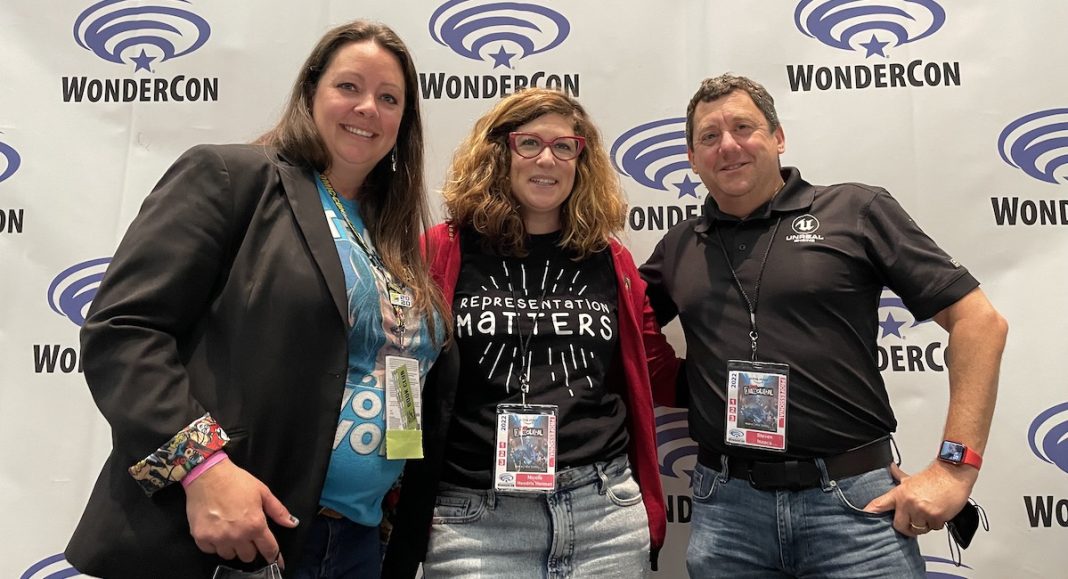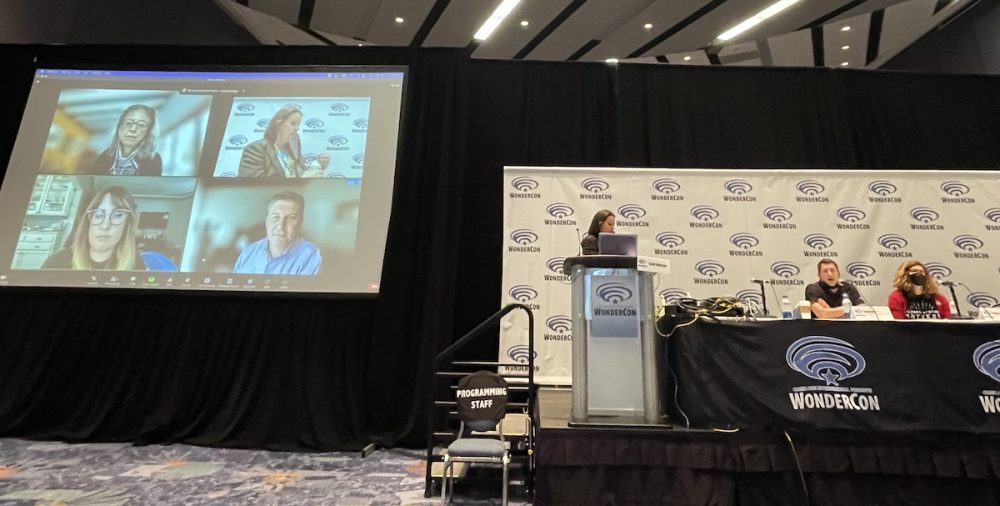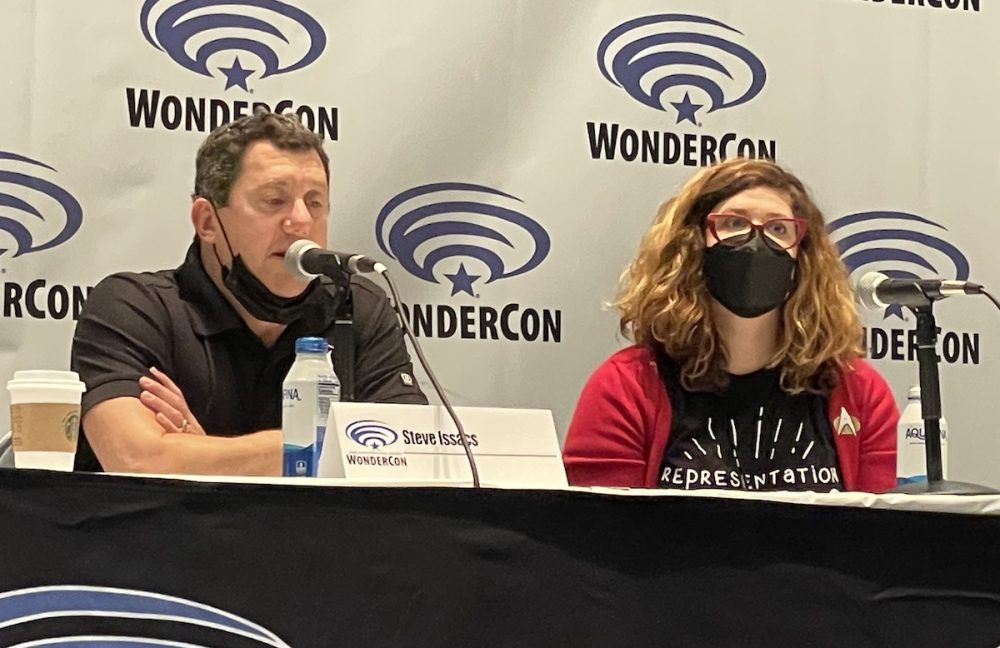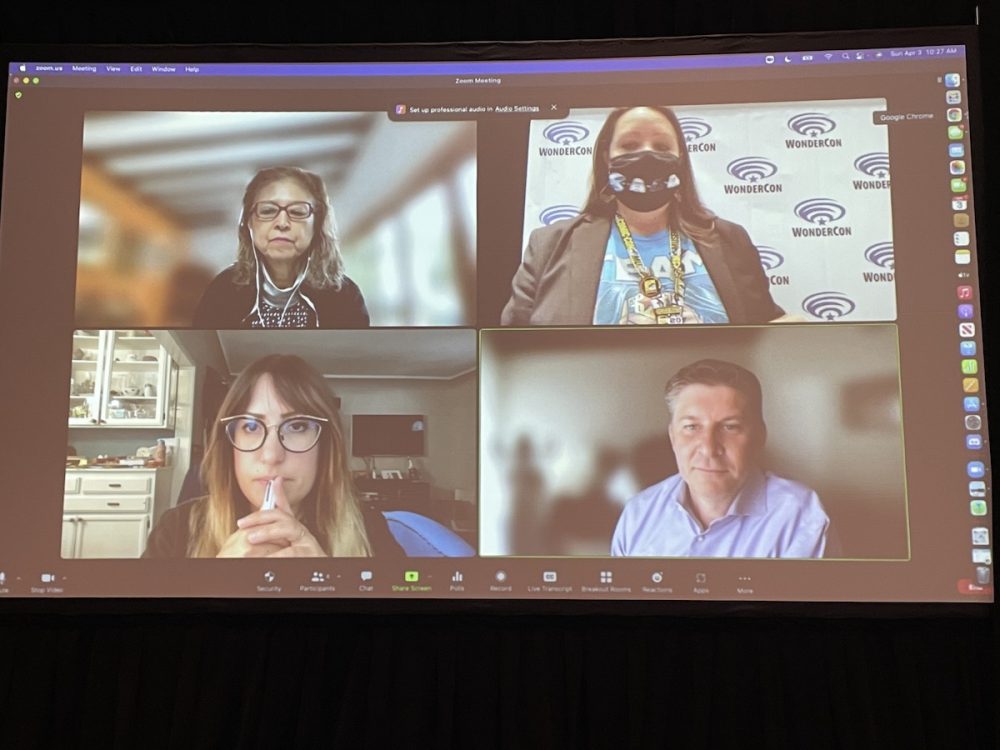By Joanne Saunders
Jinko Gotoh (Producer and VP of Women in Animation); Nicole Hendrix (Producer, executive director of the BRIC Foundation, concept Arts Association); Alison Mann (talent manager, co-president of Fourth Wall Animation; co-founder BRIC Foundation); Steve Issacs (education program manager at Epic Games); Matthew Waynee (Teacher 32nd Street USC Magnet School), and Jewyl Anderson Clarke (SD County Office of Education) are all on a mission to provide industry level skills to kids in and access to jobs in the industry. They want to educate students and parents, particularly in under-served communities, about opportunities in the broader entertainment industry. This information is especially important since the industry has a reputation for utilizing a “hiring people you know” method of hiring. The group convened at this past weekend’s WonderCon for the “Developing the Future of the Art, Media, and Entertainment Industry” panel.
“We need to work with governments, educators, parents, and studios in order to get students into this workforce. We need to educate people on how to get in,” Mann said.
Why education and training are needed
Moderator Clark, who works for the San Diego County Office of Education, said there is no federal category number for jobs in the animation industry. The one closest to what they do is “cartoonist.” There needs to be more information and statistics for research since the animation industry is a billion dollar industry.
Currently, studios are finding people through referrals, film festivals, and conventions like Wondercon. Recruiters also browse social media sites like Vimeo and Instagram and wherever creators are posting their work.
Issacs, an education program manager at Epic Games, said there are a lot of available jobs in the gaming industry such as animators, concept artists, and sound engineers. The industry is generally bucketed into three aspects of development:
-
- Preproduction: visual development, storyboarding
- Production: animators, lighters, modelers
- Post-production: editors, sound, mixing
There’s also a production management track. Overhead roles include creative recruiters, who hire all the artists and work with everyone in the team, and matching them into positions.
The fact that there are organizations like the BRIC Foundation seeking to increase representation in entertainment, gaming, media and technology industries, is an encouraging sign. Hendrix, who has a live-action, broadcasting, and gaming background, was often the only female director in an organization. She knew things would be different if there were more female leadership and influences. “What we watch permeates our culture,” Hendrix said. She partnered with Alison Mann about starting BRIC with the intention of providing a more diverse group of people access to the industry.
Hendrix says that applicants for these industry positions don’t necessarily need to go to a fancy art school to achieve these positions. “You don’t have to be interested or even talented in art,” Waynee agreed, “There are many jobs beyond art, like lighting, management, production. Some skills can overlap with other industries as well. The hope is to train students in industry skills so they can access internships and apprenticeships, which is the logical step to full-time employment after school.
Gotoh, an Oscar-nominated producer and VP of Women in Animation, is supporting the Women in Animation’s mission for gender parity in the industry to 50/50 by 2025. One crucial key, Gotoh says, is mentoring. Even though there are a lot of women enrolled in art school, for some reason or another, they are not reaching the workforce in the same numbers.
Currently working for change
To make things easier for students, a number of resources currently exist. LA City College has dual enrollment classes that can be taken at the same time as high school classes. The students can get credits for college and high school. Technical education at junior colleges can help provide skills in the industry. BRIC conducts a lot of its programs virtually and throughout Southern California.
Epic Games also provides free online learning courses in advertising, fashion and coding for kids. These courses essentially provide an introduction to virtual production. Gotoh said, “Industry partnerships are critical to give opportunities by democratizing access.” It’s important that the software is downloadable and kids and schools with limited resources have access to these resources.
The California Arts Media Entertainment Registered Apprenticeship Initiative is attempting to to build the first network of registered paid apprenticeships for careers in the entertainment industry. The initiative aims to create 500 AME apprentices in CA by 2025. Let’s help them bridge the pathways to success.
Miss any of our previous WonderCon 2022 coverage? Click here!











